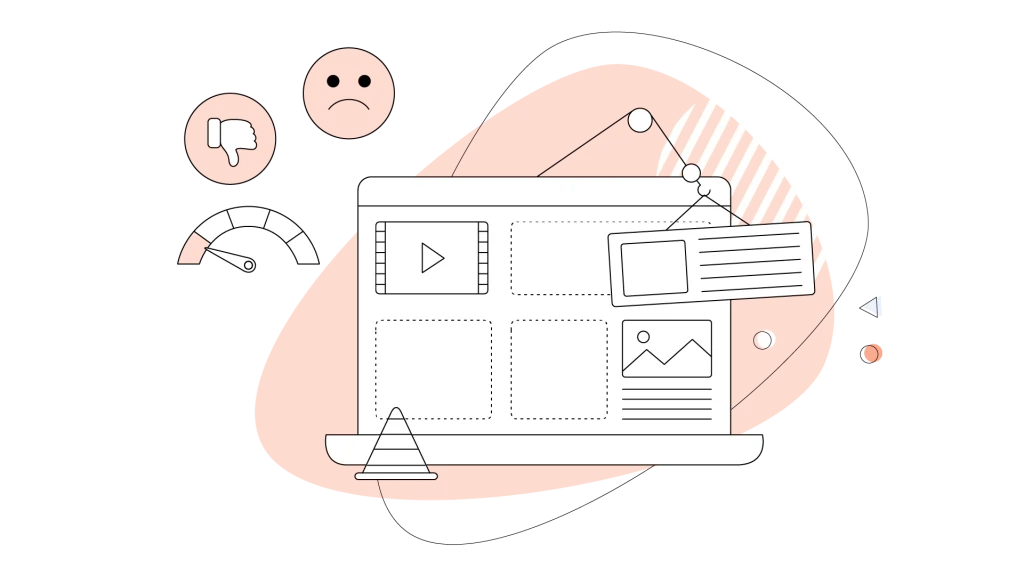Building a website is such an exciting step, whether you’re an individual ready to share your thoughts in a personal blog, showcasing your work through a portfolio, or a business wanting to step into the online world. But with so many options out there, how do you know which one is the best website builder for you?
In this guide, we’ll walk you through the most meaningful components to consider when choosing a website builder, along with some recommendations for the top website-building platforms available today.
- Pinpoint Your Necessities & Goals
- Consider Ease of Use
- Design, Customization, & Custom Domain Options
- Features You Need, Including SEO Tools
- Pricing & Value for Money
- Easy to Upgrade Plans for Future Growth
- Compare Popular Website Builders
Pinpoint Your Necessities & Goals
Before diving into the details of website builders, start by asking yourself a few key questions:
- What type of website do you need? Is it a simple blog, an online store, or a complex portfolio site?
- Do you need eCommerce functionality? If you’re planning to sell products online, consider a builder with robust eCommerce features, much like HostPapa’s Website Builder.
- What level of customization do you need? Some website builders offer drag-and-drop functionality, while others give you more freedom, letting you code your way to success.
- What’s your skill level? If you’re a beginner, you may prefer a platform with a user-friendly interface and free templates, whereas more advanced users might opt for greater control over design and development.
Once you have a clear idea of your needs, it’ll be easier to compare builders based on the features they offer and find the right website builder for your goals.
Consider Ease of Use
The user interface of your website builder should be easy to navigate. Platforms that offer drag-and-drop functionality are great for beginners, while more experienced users may prefer a builder that allows for code editing or custom CSS.
An AI website builder can further streamline the process by generating customized website templates based on your preferences and answers to initial questions, making it particularly appealing to beginners.
Look for:
- Templates: Choose a builder that provides a variety of customizable and professional-looking templates so you can start building your site with a solid foundation.
- Drag-and-drop editor: Many website builders include a visual editor that allows you to arrange elements (images, text, buttons, etc.) without any coding.
- Tutorials and support: Exceptional customer support and tutorials are essential when you run into issues. Check if the builder offers live chat, email support, or community forums.
Need hassle-free web hosting to match your simple site-building process?
Design, Customization, & Custom Domain Options
The design of your website is critical for making a great first impression. Ensure that your chosen website builder offers the following:
- Mobile responsiveness: A mobile-friendly website is a necessity in 2024. Your site must look great on all screen sizes.
- Design flexibility: Some builders allow you to tweak the layout, colours, fonts, and images, while others provide limited customization.
- Pre-designed website templates: Whether you’re building a blog or an eCommerce site, templates can save you time and provide professional designs, but make sure they can be easily adapted to suit your brand.
Features You Need, Including SEO Tools
Website builders vary greatly in terms of features, so it’s noteworthy to select a platform that offers the tools you’ll need:
- SEO tools: Good search engine optimization (SEO) capabilities will help your website rank higher on Google. Ensure the builder includes features like customizable page titles, meta descriptions, and integrated analytics.
- eCommerce support: If you’re building an online store, look for an eCommerce website builder with secure payment processing, inventory management, and the ability to scale as your business grows. Platforms like WooCommerce and Shopify are designed specifically for this purpose and offer built-in functionalities for eCommerce.
- Blogging capabilities: Some builders are better suited for blogging than others, with built-in features like comment sections, RSS feeds, and social media sharing options.
- Integrations: Consider whether you need to integrate with other services like email marketing tools, social media platforms, or payment gateways when you’re exploring eCommerce.
Pricing & Value for Money
While some website builders are free and should be treated with caution, many premium options offer advanced features and greater customization for a reasonable price. Be sure to evaluate:
- Free vs. paid plans: Many builders offer free plans with limited features, but paid plans generally include more robust options like custom domains, eCommerce functionality, and additional storage. When looking for the best free website builders, consider the features and limitations of each platform.
- Pricing tiers: Compare the different pricing plans and check what features are available at each level. A free website builder can be advantageous for beginners or small businesses needing a quick online presence.
- Trial periods: Many website builders offer free trials or money-back guarantees, so take advantage of these to test the platform before committing to a paid plan.
Easy to Upgrade Plans for Future Growth
Your website should be able to grow and expand with your business or personal brand. Choose a website builder that:
- Supports future expansion: Ensure that the platform can scale with your needs, whether it’s adding new pages, products, or features. It’s fantastic when you have the freedom to add marketing and SEO tools, connect a custom domain, or add additional security services to your website builder at any time.
- Flexible plans: As your site grows, you may need to upgrade to a higher-tier plan. Check that the website builder offers flexibility as your needs evolve. The platform should be able to let you upgrade easily without forcing you to recreate your website from the beginning.
Compare Popular Website Builders
To help you make an informed decision, here are some of the best website builders in 2024. Other website builders offer a variety of features, pricing, and usability options, catering to different needs and target audiences:
- HostPapa Website Builder: Designed for simplicity, this user-friendly website builder features a drag-and-drop editor, offers free domain registration, and supports up to 1,000 pages along with eCommerce tools to help you get started efficiently.
- WordPress.com: A powerful platform for bloggers and content-driven sites. While the free plan is limited, WordPress offers excellent SEO and customization options.
- Weebly: A user-friendly platform with eCommerce functionality, best suited for small businesses and personal websites. It provides an easy-to-use drag-and-drop editor.
- Webflow: For advanced users who want complete design control and the ability to build fully custom websites without coding. Great for professional designers and developers.
Final Thoughts: Choosing the Right Site Builder for You
Selecting a website builder comes down to your unique needs. Whether you’re a complete beginner or an experienced web designer, there’s a platform out there that can help you achieve your goals. Take the time to compare your options, test out free trials, and consider future scalability before making your decision.
If you’re ready to get started, try out a few builders and experiment with different designs, and soon, you’ll have a beautiful, functional website that suits your needs. Building your own website offers complete control over design and functionality, making it an essential tool for self-expression, credibility, and professionalism.
Don’t leave without securing the perfect hosting plan for your new website!
Frequently Asked Questions About Website Builders
Can I build a website for free?
Yes, you can build a free website using various website builders like WordPress.com, but they often come with limitations, such as ads on your site or fewer customization options. Free plans are great for simple projects, but for a professional look, you might want to upgrade to a paid solution from a reputable web hosting provider.
How to decide on the website design elements?
Choosing the best options is purely subjective. However, a good approach is to select simple yet effective colours and customize any templates that accompany your website builder plan.
What do I need to know before building a website?
You must have a clear purpose for developing the website in the first place and a specific target audience. Additionally, you’ll require a domain name, a website-building platform, and a hosting provider to hold everything together. Choosing a reliable web host can simplify the process, as some offer all-in-one packages, allowing you to pay once and have everything you need in one place.
How long does it take to build a website?
The time it takes depends on the complexity of your website. A simple site can be created in a few hours (or minutes even), while more complex sites may take several days or weeks. Factors that play a significant role in speeding up website design are the drag-and-drop interface, AI-powered content creation, and a stock photo repository.
Do I need coding knowledge to use a website builder?
No, most website builders are designed to be user-friendly and don’t require coding knowledge. However, some advanced platforms allow you to add custom code if needed.
Can I switch website builders later?
Switching between website builders can be challenging, especially if your site is large or contains complex features. It’s best to choose a builder that fits your long-term goals from the start.



